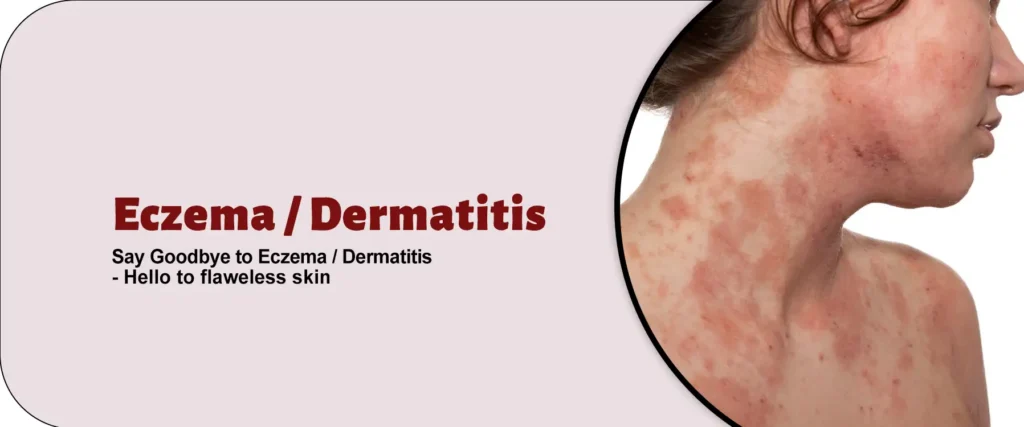
Say Goodbye to Eczema & Dermatitis – Embrace Clearer, Healthier Skin
12 Years of Expertise: Dr. Vijay Kumar Helps You Say Goodbye to Eczema & Dermatitis!
Eczema Dermatitis: Symptoms, Causes, Treatment, and Prevention
Eczema dermatitis or simply called eczema is one of the most frequent skin diseases that is not limited by age. This is a long-term skin disease marked by dryness, itching and erythematous-squamous rash, involving several areas of the skin. The following enlightenment of the symptoms, causes, treatments, and preventive measures likely to be useful to any person suffering from eczema.
What is Eczema Dermatitis?
Eczema dermatitis is a skin disease that brings inflammation causing itchy, red and as a rule, cracked skin. However, the common areas that are affected by the disease are the hands, feet, face and the elbow regions. In its intensity, it is not universal but ranges from mild symptoms, for which some people have to scratch their skins intensively.
Common Symptoms of Eczema Dermatitis
It is important to know the characteristics of eczema dermatitis for prompt detection and intervention. The usual indications are as follows:
- Severe itching: This is usually the most noticeable sign and also causes further irritation as it is scratched.
- Reddish and swollen: The skin may turn red or swell, particularly in case of exacerbations.
- Dry, flaky areas of skin: Areas of the body with affected skin become overly dry with visible flakes of skin.
- Bumps and fissures: In extreme cases, the skin may blister or split open posing a threat of infection.
Symptoms often vary by individual and in addition can depend on factors like environmental settings, aging and even stress.
What Causes Eczema Dermatitis?
While the aetiology of eczema dermatitis skin inflammation is yet to be understood fully, certain elements may precipitate or aggravate the condition as outlined below:
- Hereditary Factors: Research shows that people who have a record of having eczema or other atopic diseases including asthma and allergic rhinitis will be more likely to be diagnosed with the dermatitis.
- Disordered Immunity: There are reasons to assume that Eczema is an immunological disorder leading to inflammation.
- External Irritants: These may include soaps, detergents, and some fabrics as the most common onesExamples of carriers are soaps, detergents, and some fabrics as most likely. In addition, cold weather, allergens or low humidity can trigger the flare up.
- Stress: Increased stress alters the body allowing an extreme flare up of eczema leading to flare or reverse symptoms.
Types of Eczema Dermatitis
Eczema dermatitis encompasses several types, including:
- Atopic Dermatitis: Atopic dermatitis is actually the most prevalent type of this disease, which many children experience before they reach preschool age and are prone to allergic diseases.
- Contact Dermatitis: Results from contact with an allergen or an external agent that irritates the skin.
- Seborrheic Dermatitis: Usually occurs in those areas which have sebaceous glands, for instance the head and face.
- Nummular Eczema: Recognizable by round, coin-shaped disk, lesions that can manifest on virtually any part of the body.

Treatment Options for Eczema Dermatitis
The condition of the eczema dermatitis should be handled with a holistic plan of treatment by use of medicines and alteration of one’s lifestyle. Here are the most common treatment options:
- Topical Corticosteroids: These help decrease inflammation and itching but should be used for the long term with caution.
- Moisturizers: Avoiding dry skin is a great way to avoid exacerbating the condition as it is a common eczema symptom.
- Oral Medications: In acute cases the patient may be given oral corticosteroids or immunosuppressive drugs.
- Light Therapy: Also known as phototherapy, this treatment helps the skin to be exposed to specific amounts of UV light that calm inflammation.
- Biologics: Novel therapies for the severe form of eczema are biologics that act on specific receptors that cause inflammation.
Preventing Eczema Flare-ups
Proactive measures against eczema exacerbations can be instituted through proper moisturization of the skin and other lifestyle changes. The following tips may be more effective:
- Moisturize Regularly: Tap water and other forms of cleansing the skin are allowed without the use of moisturizers or lotions after.
- Use Gentle Cleansers: This is to prevent seeking out harsh soaps or soaps containing fragrances or other irritants for very sensitive skin.
- Wear Soft, Breathable Fabrics: Most individuals with eczema do well not irritable fabrics such as soft cotton.
- Manage Stress: Relaxation techniques such as prayer and meditation or yoga will be useful to prevent stress-induced flare-ups.
- Avoid Known Triggers: Assess and reduce the use or possibility of contacts with any allergens or irritants that trigger rejection of your condition.

When to visit a Dermatologist
If the symptoms of eczema do not improve with the help of OTC medications, a consultation with a dermatologist is worth considering. A dermatologist is able to assess the specific type of eczema, suggest appropriate treatment options and manage their potential side effects.

About Dr. Vijay Kumar:
MBBS, MD (DERMATOLOGIST)
Dr. Vijay Kumar, MD, is a leading dermatologist and founder of AWISH Clinic in New Delhi, India. Educated at Banaras Hindu University, one of Asia’s top universities, he heads a team of skilled dermatologists. AWISH Clinic is equipped with the world’s latest technology for aesthetic procedures, cosmetic surgeries, dermatology for skin and hair issues, hair transplants.
Books written by Dr. Vijay Kumar



Membership and Association








Contact us now
Book your Appointment
Book your appointment at AWISH Clinic online or by phone for expert dermatological care, including aesthetic procedures, cosmetic surgeries, and more. Led by Dr. Vijay Kumar, our clinic offers state-of-the-art treatments in New Delhi. Secure your visit now.
